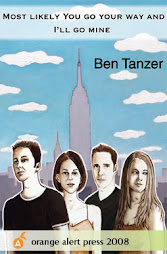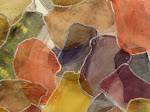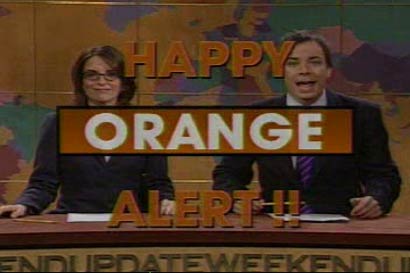 C. Robin Madigan
C. Robin MadiganMy first encounter with C. Robin Madigan went as follows; "I'm not attempting to "blow" any minds and I hope you like it". He introduced himself as fan of Blake Butler, and proceeded to tell me what year each of his instruments were made. You see, Mr. Madigan is a grad student on the verge of the illusive MFA in writing, but it seems that his passion is DIY music. Since that initial e-mail back in February, he has sent me a new mp3 every few weeks. He loves to talk about his music, but down plays his writing. So I decided to investigate his writing for myself. I found "Tape Hiss" in Storyglossia, "You'll Die" in Elimae, and "The Mess You Made in Us" in SmokeLong Quarterly, and I enjoyed them all.
Everyone has a dream, everyone secretly slaves away at a something they love, late at night when no one is looking. These are the dreams that keep us going, and fuel our days and nights. I rarely talk about my job, but I could spend hours discussing arts and culture or talking about publishing books. I look forward to receiving songs from Conor, not just because they sound great, but because of the honest excitement behind them.
When Orange Pulp was released, C. Robin Madigan, was the only contributor who hadn’t been previously featured on Orange Alert. So here is my attempt to fill in the details and share the words and sounds of C. Robin Madigan.
Orange Alert (OA): In May you will receive your MFA, what do you plan to do with it?
C. Robin Madigan (CM): Write novels and sell novels and stories I've written.
OA: The first chapter of your novel, Alo, Bunny, was recently published in Cutthroat. What can you tell us about your novel?
CM: I hope I achieved mastery of conventions needed to support my prose. I wrote sentences with my own rhythm; syntax I know, and collected parts of a world I know as a Being in a world. I hope, as well, to show how much respect I have for writers who influenced me as I first read. I can't sum up the story or try to hold it for you to let you see. I think I've done that well with the work.
OA: Do you feel a writer needs community or network to gain audience? Writing, itself, is a solitary art, but publishing is a completely different world.
CM: It's best to send your work to places you love to read when trying to find an audience. An astounded reader will go to her loved ones and whisper, "hey, does this startle you as well?" thus readership via adoration builds.
I know nothing about publishing. It happens and feels ephemeral, like it may not happen again, time and again. I don't know writing as a solitary art. I have many voices, and they're quite loud.
OA: You are not only a writer, but also a musician. What lead you to start recording music?
CM: My mum heard me bellow, singing at six or seven years old, in the shower. She had me to a boy's choir and music became serious. I sang three days a week.
I'd just turned sixteen when I bought a tape machine. Initially I just made noise and harmonized it with my voice, as many voices as I could possibly ping-pong. From then until college's end I recorded on that damn piece of junk. I needed a penny to jam the record button so it'd work after my band had worn it through.
After college Brian and I threw a bunch of money together and spent it all at Mercenary Audio, in Boston. Now we record everyday, no matter what it's required—noise; sound pieces; fake interviews; tet-a-tet, monologue, yells, yammers; insect footsteps recorded high-gain; country; western; prog; scape; lounge; techno; screamo; bebop; jazzfunk, horn blats through a fender reverb tank, hits on the old heater, bottles, scraping teeth, silent wonton flex affront a Telefunken mic, everyday things.
OA: Do you approach writing lyrics differently than short stories or poems?
CM: Short stories and poems go through hundreds of drafts, even more for a novel. The Mess You Made In Us, a Miniature in SmokeLong Quarterly, went through about fifty, and it's two hundred forty-five words. The New York Tyrant pieces drafted more than even that, and they're shorter. This interview: six hundred sixty-nine words.
Lyrics come in the moment I scream, sing, whisper, or drool them out. I write them down and fix a tense issue or ordering, but then I'm done. I don't really think lyrics need to have meaning or rhyme. Just get some nouns verbing and play good bass.
OA: What's next for C. Robin Madigan?
CM: To accept volatile life—It's been a few years now where I've let my limitations become static. I'm urgent to produce work.
Listen to: Beg For More (mp3) and Every Minute (With You) (mp3) and Don't Dream For Us (mp3)
Bonus Questions:
OA: Coffee? If yes, what is your favorite type of coffee and where is your favorite coffee spot?
CM: Casteel Coffee has the only roast master I'll buy from, and I pull shots all day at my parent's and brother's houses. Best meal: 4 shots espresso, two fuji apples quartered, and a bit of almond butter.
OA: It is clear what type of music you like to play, but what type of music do you listen to and who are a few of your favorites?
CM: Patsy Cline(medium soft), Dusty Springfield(loud), Nick Lowe and The Zombies(louder), Mahler (really, very loud).
For more information on C. Robin Madigan you can visit his website.
+by+Nick+Volkert).jpg)





















2 comments:
nice painting.
sWeaTYUNKleMIke
it's painted by this guy who can't eat chocolate. what a travesty!
Post a Comment